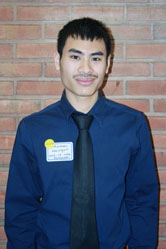Major: Biological Sciences
“A Comparison of Genetic and Epigenetic Diversity Between Urban and Nonurban Populations of a North American Stream Fish (Etheostoma olmstedi) in the Potomac Basin”

Many urban pollutants such as metals (e.g., cadmium, arsenic), peroxisome proliferators (e.g., trichloroethylene), and endocrine-disrupting/reproductive toxicants (e.g., bisphenol A) have been shown to alter the epigenome, specifically DNA methylation. The epigenome literally translates to "above the genome," and is composed of numerous chemical modifications to DNA and histones, such as methylation of cytosine bases and acetylation of lysine residues in the histone tail. Methylation typically occurs at the 5-C of cytosine in DNA and does not alter the nucleotide sequence. However, DNA methylation can effect gene expression and has been shown to be transgenerationally heritable for many traits, therefore providing a potential substrate for evolution. The goal of this study is to test the hypothesis that urban pollution affects epigenetic DNA methylation diversity both within and between natural urban populations and clean reference nonurban populations of a freshwater stream fish. Genome-scan methods known as Amplified Fragment Length Polymorphism (AFLP) and Methyl-Sensitive Amplified Polymorphism (MSAP) will be utilized to assess both genetic and epigenetic diversity in six different urban/nonurban populations of Etheostoma olmstedi (Tessellated Darter) in the Potomac basin. Significant differences in epigenetic diversity between the urban and nonurban populations may suggest a role of anthropogenic activity in evolution.
How did you find your mentor for year research?
I went to the UMBC Biology website and read about the research that the faculty is involved in. I then emailed the professors whose research interests me.
How did you know this was the project you wanted to do?
My mentor gave me several options on what research projects to do. I chose the one that suited me best.
Is this your first independent research project?
No, I worked on several projects within the same field prior to this independent research.
Do you get course credit for this work?
When I first started I did; however, I have the maximum allowed credit for research so I do not get anymore. Now I get a zero-credit practicum on my transcript from the Shiver Center.
How much time do you put into it?
It varies depending on what needs to be done next. Usually about 15 hrs/week.
How did you hear about the Undergraduate Research Award (URA) program?
I attended URCAD the year before and asked one of the previous scholars about how she was funded for her research.
What academic background did you have before you applied for the URA?
I’ve taken many biology and chemistry courses with their respective labs to help me prepare for this research.
Was the application difficult to do?
No, the questions were basic. The most difficult part was to write a professional abstract without it being too long.
How much did your mentor help you with the application?
I did not have a lot of experience writing abstracts, and she guided me in the right direction and did the final edits to it.
What has been the hardest part about your research?
In research it is common for things to go wrong. The most difficult part is to figure out what went wrong and how to fix it.
What was the most unexpected thing?
I was able to see a different side of research then what you would normally read in a textbook. Part of it was going out in the field to collect and identify specimens.
How does your research relate to your work in other classes?
I find my classes easier because research allows me to think like a biologist. When learning about experiments in the textbook, I often think about how I would answer the same question using a different method.
What else are you involved in on campus?
I tutor and TA for organic chemistry and I am a pre-dental officer.
What is your advice to other students about getting involved in research?
Asking professors to get a position in their lab can be difficult because there just isn’t enough room. Do not be discouraged if you get rejections. Another good way to get in is to talk to your professors after class. They will remember you and when it comes time for interviews you will have an advantage.
What are your career goals?
I plan to go to dental school after I graduate UMBC.
Did you transfer to UMBC?
Yes, I am a transfer student from CCBC.
5/18/2023